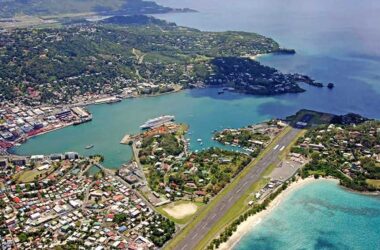
Two Caribbean events last week reminded that if in physics like poles repel and unlike ones attract, not so in the science and mathematics of Caribbean economics and finance, where combinations of additions don’t necessarily always mean exclusion of subtractions.
Indeed, from the words and actions of regional government and finance leaders at a press conference in Castries and an agriculture summit in Trinidad & Tobago, it’s clear that CARICOM’s future today is in better hands and minds.
From what the leaders said in Castries and Port of Spain last week, it’s also pellucidly clear that when like minds meet, it’s neither a collision nor a clash, but a communion of common views.
Take the two back-to-back top meetings last week involving the regional and sub-regional development and central banks’ President and Chair of Board of Governors, followed by the region’s second major agriculture summit in three months.
The unusual and unprecedented approach to a joint press conference on August 18 by Caribbean Development Bank (CDB) President Dr Hyginus ‘Gene’ Leon, and Chair of the Board of Governors of both the CDB and the Eastern Caribbean Central Bank (ECCB), Saint Lucia’s Prime Minister Philip J. Pierre, saw the two sit together with youth and the regional press to launch the CDB’s 53rd Annual General Meeting, to be hosted by Saint Lucia in June 2023.
The double-barreled hybrid Press Conference Saint Lucia meeting, held under the theme ‘Marshalling Finance for Development’ with emphasis on ‘Access to Affordable Financing’, was also attended online and offline by local and regional reporters, started with a joint-presentation by the presidents of the island’s youth and student councils, inquiring about plans for youth inclusion in the building of the much-needed resilient and sustainable economy.
The President and the Prime Minister presented their respective visions of how the CDB and ECCB can together adapt and adopt common policies, now and tomorrow, to better prepare for, confront and extract the best from opportunities and needs that come with current challenges.
They called for combination of institutional minds and resources to ensure a commonality in approaches to the region’s common problems over time, particularly addressing the ongoing problem of access to available and affordable funds and how to release the brakes by developed nations and international financial institutions measuring nations’ economic development by Gross Domestic Income, thereby catapulting the Caribbean to upper scales of graduation on the global economic totem pole, but above qualification for deserving and needy finances.
They also posited that the future of Caribbean development will depend on youth involvement and leadership, to survive the contemporary global economic pitfalls for small-island and developing states everywhere, also increasingly accelerated by unpredictable Climate Changes.
Honing their multiple talents and marrying their long professional experiences with new and existing facts and features to address the essential points raised by the youth representatives, the two decisionmakers took respective turns to paint common picture of a new Caribbean society confronting its challenges head-on, instead of postponing the plights to be addressed by today’s youth when they grow older; and both urged the region’s youth not to wait to grow old to take charge of their (and the region’s) tomorrows.
The second big event last week was the Agri-Investment Forum and Expo II (August 19-20) hosted by Prime Minister Dr Keith Rowley and attended by CARICOM Heads of Government, including Prime Minister Pierre, which followed a regional agriculture forum and expo in Guyana in May.
It heard positive reports of the latest achievements on everything from the region’s continuing and accelerated quest for food security to joint and bilateral projects, programs and proposals, including higher food production reports and recommitment by leaders to pursue earlier-expressed goals, including removal of restrictive import restrictions on regional products.
The T&T meeting was another bountiful chest of fresh ideas and new signs of cooperation between Caribbean nations to show they can walk the talk: from creation of a regional food depot in Barbados (with plans for others in Jamaica and Antigua & Barbuda) to plans for closer and deeper trade ties between the smaller island and larger CARICOM states — like Jamaica soon to export bananas to Trinidad & Tobago — while Saint Lucia is again exporting bananas to the UK and Antigua & Barbuda.
Signs are emerging of a new regional banana industry, this time more inward-looking than solely-geared for European markets, a welcome new move for the banana-producing Windward Islands (Dominica, Grenada, Saint Lucia and Saint Vincent and the Grenadines), whose economies were once so strongly tied to the then ‘Green Gold’ that they suffered irreparable losses when their decades-old preferential treatment on the UK market was successfully challenged in 1996 at the World Trade Organization (WTO) by US-owned multinational private banana companies in Central America, backed by the Clinton administration.
With efforts at rebuilding the industry starting with intra-regional exports, there’s also room for every traditional producer-nation to also get-in on the act, by not only awaiting new conditions for re-entry into the UK, but also developing a new regional market that will sell the nutritious golden fruit that athletes worldwide cannot do without, to Caribbean people as well – and open-up new possibilities for creative, value-added investments and entrepreneurial start-offs for banana by-products, including manufacturing porridge and ketchup, rope — and paper.
The leaders also heard positive reports on moves to reduce the region’s Food Import Bill and Increasing Food Security, with Saint Lucia, Jamaica and Trinidad & Tobago posting positive production performance reports for everything from pork and poultry to fruits and vegetables, onions and ‘Irish Potatoes’.
Indeed, agriculture is again on the move and the region’s youth are finally being offered and invited to take their places and play their roles in building a sustainable future, not tomorrow or next year, but starting today – and now…
But will they rise to the challenge?
They can and should!













